#priestess of hestia
Explore tagged Tumblr posts
Text
HESTIA & FLAMESKEEPER ASKS DUMP
A/N: Hi so I got these three Hestia and Flamekeepers asks in mass so I'll just be all answering them all in here cause they're all related more or less. Prepare for lots and lots of text:

Anytime some child or woman sits by a fire source, a fireplace, a little campfire in the woods or in the streets, Hestia is there in spirit, making them warm like they have been personally been wrapped in a warm blanket by her that lulls them to sweet dreams and when they wake up, they'll find a little gift; whether it's a bit of money, food, or when they soon find help. If that child is particular, they'll find tiny holes in their clothes, made by tiny embers that provide them a blessing from the goddess herself. When they come across the Flameskeepers and they choose to keep their old clothes, they don't mend the holes the Embers made. Any new clothes they were given to them, weaved, mended, and fitted, many instinctively, and deliberately let the embers create tiny holes in them as a reminder. Even if they do not choose to remain with the Flameskeeper, they continue to stoke the fire in honour of Hestia and her flamekeepers, and all their clothes have the smell of fresh bread, smoke, and fire on them.

mentioned something to this in this ask here: https://www.tumblr.com/audreyscribes/746629501264576512/how-are-hestias-flamekeepers-im-going-to-call?source=share
Like the Huntresses who have their silver palkas and gear, when enough time has elapsed and when they pledge to Hestia, they’re gifted with a veil. It not only as a minor protection, it also has minor invisibility that lets the wearer hide away from evil, harm, and such. It's not as invincible as wearing the Nemean Lion hide or powerful with the invisibility as the Helm of Darkness of Hades, but for a priestess of Hestia? That’s more than enough. You can wear it on your head like a veil or a headcovering (i.e. tichel, hijab, dupatta, so forth), a shawl, a scarf, to wrap around your waist, or whatever you like you find comfortable. It’s been weaved together with the help of all the sisters within the Flameskeepers with little ember hole marks by Hestia. If the Flameskeeper don’t have the beads from Camp Halfblood or Tattooed by Camp Jupiter, they have (also) the veil. Each year you all get together to embroider your veil with a design, helped by your sisters or by yourself, showing everyone. It can be elaborate or as simple as you like.
First and foremost, there’s no real obvious emphasis on status with Hestia’s priestess. Other than ‘high’ priestess, the seniors, and so forth, much like the actual priestess of Hestia, it’s pretty much equal. The only external/physical way you can probably tell who is senior and how long they’ve been around is with their veil and the amount of embroidery they’ve added every year since they’ve been a Flameskeeper. Otherwise, it’s your years of service, knowledge, skills, and your character, that prove to others but you won’t see any show-offing because your fellow Flameskeepers and priestess are your family and community.
Other than the veil, there's no real strict or specific dress code that the Flameskeepers have to follow in terms of pieces... What they do have to wear is more a general suggestion and follows more common sense; like you're going to need to wear clothes that are suitable for work around the house and hearth. Like you're free to wear shorts and t-shirts if you want but don't wear anything that is flammable (i.e. polyester, nylon) cause you will go up in flames, and you're lucky that Hestia saved you, and you're going to get a lecture from not only her, the children of Apollo, and the other older Flameskeeper on fire safety. Just wear clothes that are appropriate, practical clothes that are appropriate for the work you're doing and it'll be fine.
In terms of vibe: There's a sense of modesty, and simplicity with nothing explicit that resonates Hestia or aligns with her virtues. Some of the older flamekeepers vibe with the Ancient Greek wear "Chiton- a tunic of two different styles, Doric and Ionic, worn by both sexes" , "Peplos - a garment worn mainly by women over a chiton or instead of one", paired with the veil/shawl that acts as the "Epiblema-a shawl worn over a chiton or peplos by both men and women"; otherwise, you do you, you can also go full lumberjack, cottagecore, or whatever. As for Make-up, you're free to wear makeup if you want but nothing overly excessive; mostly because it’ll be wasted effort. You’re going to be sweating it off, grime and dust, the heat and smoke of the fire is going to mess with it, among other things and there are things to do to get done. Besides with the minor blessing of Hestia, with her bestowing her flamekeepers with youth and vigour to them, the need for make-up is not entirely necessary.
Accessories are fine like for the clothes, just as long as they’re not excessive and don’t get in the way of work. If you’re working on the looms or doing any weaving, just remove or roll up your bracelets and charms so they don’t get caught, or make sure the metal doesn’t sting and burn you if you’re working by the fire.

Okay I've never made a playlist or recommended songs based on a theme before, and I have limited music tastes so hopefully these are alright. Don't expect me to recommend many songs cause again, limited music tastes. Hope this will suffice Tyche demigod/ Clover anon!
“Smokes Rising Like Lifted Hands” - The Oh Hellos
“A Kindling, of Sorts” - The Oh Hellos
“Hestia” - Greek Mythologist
“Homesick” - Noah Kahan
“Bloom- Bonus Track” - The Paper Kites
“Concerning Hobbits” from Lord of the Rings
“Ashes” by Celine Dion
“Orphic Hymn to Hestia” by Queenie
“Hestia” - the Citrus Trees
#hestia#hestia cabin#hestia headcanons#flameskeeper#flameskeeper of hestia#priestess of hestia#priestesses of hestia#pjo imagine#demigod h/cs#pjo imagines#pjo#scribe's note#ask the scribe#pjo headcanons#percy jackson and the olympians#songs#music#song recs
24 notes
·
View notes
Text
Behold, the true Chinese Barbie and her friends (???)














#shining nikki#barbie generator#this generator is the best#shining nikki lilith#shining nikki ashley#dodora#priestess tess#shining nikki yisu#shining nikki zoey#shining nikki lolory#shining nikki hestia#shining nikki glow#goddess of desire#shining nikki ophelia#shining nikki joy#even fucking joy made it in#shining nikki yexiao
92 notes
·
View notes
Text
I just had a dream that i gaslit a poor soul trying to trust her intuition just to keep him in my life I'm the fuck out of here
#not very#hestia#priestess#of me#but also#maybe yes#like i want everyone to be happy#included me is that wrong#btw this is about#c#his gf exactly so#i'm justified i feel#love#polyamory#heartbreak#let him go
0 notes
Text
Tarot Card Associations for Hellenic Deities
Fool - Dionysus, Hermes, Pan, Ate, Gelos, Momus, Horme
Magician - Hephaestus, Hermes, Hecate, Aristeaus, Circe, the Muses, Apollo
High Priestess - Hecate, Persephone, Hera, Circe
Empress - Hera, Aphrodite, Demeter, Hestia, Gaia, Rhea
Emperor - Zeus, Hades, Poseidon, Ares
Hierophant - Demeter, Persephone, Hecate, Hestia, Hera, Gaia, Rhea
Lovers - Aphrodite, Eros, Dionysus, Adonis, Hera, Philotes
Chariot - Hermes, Charon, Iris, Morpheus
Strength - Athena, Ares, Heracles, Nike, Bia, Kratos,
Hermit - Hades, Hestia
Wheel of Fortune - Hermes, Tyche, the Fates, Zeus
Justice - Athena, Themis, Nemesis, Astraea, Apollo
Hanged Man - Hermes, Harpocrates, Prometheus, Psyche
Death - Hades, Thanatos, Dionysus, Charon, Persephone, Ares
Temperance - Athena, Demeter, Artemis, Harmonia
Devil - Dionysus, Pan, Comus, Ate, Priapus
Tower - Ares, Poseidon, Deimos, Phobos, Eris, Moros, Enyo, Hybris
Star - Aphrodite, Artemis, Astraea, Urania, Hermes, Eos, Hesperus
Moon - Selene, Artemis, Hecate, Nyx, Hypnos, Erebus
Sun - Apollo, Helios, Hemera, Hyperion
Judgment - Zeus, hades, Athena
World - Hermes, Demeter, Gaia, Hestia, Harmonia, Pan, Tyche
#I havent seen a compiled list like this#so I figured I'd give it a shot#I wanted to include lesser-known deities too#helpol#greek gods#witchblr#hellenic polytheism#tarot#paganism
2K notes
·
View notes
Text
hellenic gods and the major arcana
the following are the 22 major arcana tarot cards and their associated hellenic deities. they are each sorted into two sections: gods associated with the literal interpretation of the card (for example, when the death card actually indicates death), and gods associated with the meaning of the card. I did not include the reversed meanings because there are several ways to interpret reversed cards, and therefore associations should be made on a case by case basis.

0 - THE FOOL
the card: Apollo, Hermes
the meaning: Hermes, Dionysus
I - THE MAGICIAN
the card: Hekate, Circe
the meaning: Hekate, Hephaestus, Athena, Hermes
II - THE HIGH PRIESTESS
the card: Hekate, Hera
the meaning: Hekate, Hera, Demeter, Persephone
III - THE EMPRESS
the card: Hera, Persephone, Aphrodite
the meaning: Hera, Aphrodite, Demeter, Rhea
IV - THE EMPEROR
the card: Zeus, Hades, Kronos, Poseidon
the meaning: Zeus, Ares, Athena
V - THE HIEROPHANT
the card: Hermes
the meaning: Dionysus, Hestia, Hekate
VI - THE LOVERS
the card: Aphrodite & Ares, Eros & Psyche, Hermaphroditus
the meaning: Aphrodite, Hera, Eros, Dionysus
VII - THE CHARIOT
the card: Artemis, Apollo
the meaning: Nemesis, Ares, Athena
VIII - STRENGTH
the card: Ares, Athena, Zeus
the meaning: Ares, Athena, Hestia, Artemis
IX - THE HERMIT
the card: Hestia, Hades, Hephaestus
the meaning: Athena, Cronus
X - WHEEL OF FORTUNE
the card: Hermes
the meaning: Hermes, Zeus
XI - JUSTICE
the card: Zeus, Athena
the meaning: Apollo, Zeus, Athena
XII - HANGED MAN
the card: Hermes
the meaning: Apollo, Hermes, Poseidon
XIII - DEATH
the card: Hades, Persephone
the meaning: Hekate, Hades, Thanatos
XIV - TEMPERANCE
the card: Apollo
the meaning: Apollo, Athena, Artemis
XV - THE DEVIL
the card: Dionysus, Pan, Hades
the meaning: Dionysus
XVI - THE TOWER
the card: Zeus
the meaning: Ares, Poseidon
XVII - THE STAR
the card: Apollo, Artemis
the meaning: Aphrodite, Hestia, Hekate
XVIII - THE MOON
the card: Artemis, Selene
the meaning: Artemis, Hekate
XIX - THE SUN
the card: Apollo, Helios
the meaning: Apollo, Aphrodite, Dionysus
XX - JUDGEMENT
the card: Hades, Zeus
the meaning: Apollo, Hades, Hekate

XXI - THE WORLD
the card: Rhea, Pan, Demeter
the meaning: Hermes, Demeter
divider by @vibeswithrenai
#pagan#witch#magic#magick#divination#polytheism#witchcraft#witchblr#paganism#polytheist#hellenic pagan#hellenic gods#hellenic paganism#hellenism#hellenic polytheism#helpol#hellenic polythiest#hellenic polytheist#tarot witch#tarot deck#tarot reading#tarot cards#tarot#tarotblr
668 notes
·
View notes
Text
TAROT ASSOCIATED WITH DEITIES AND ENTITIES
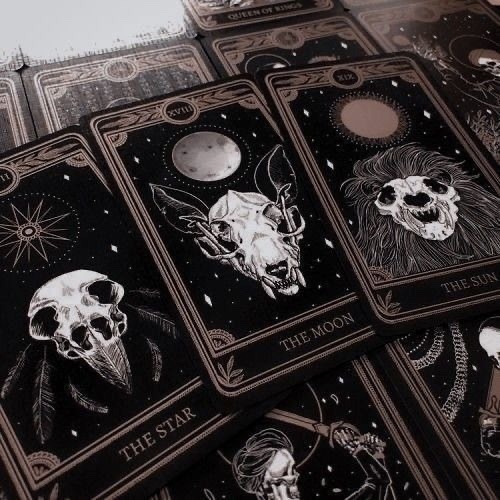
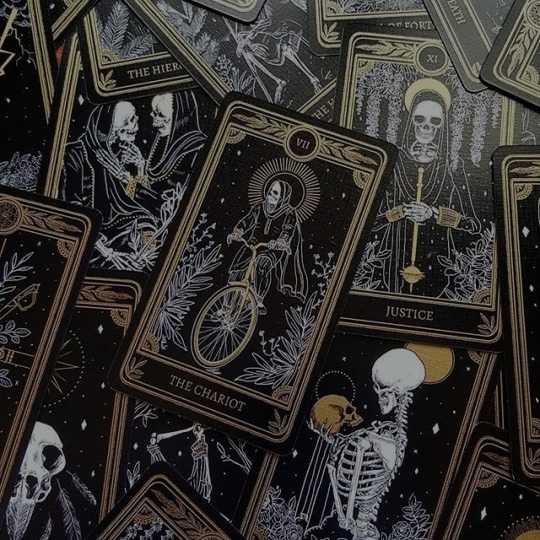
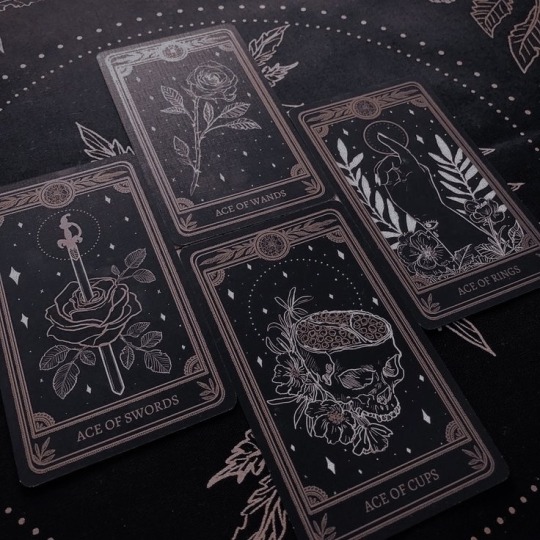
MAJOR ARCANA:
THE FOOL: Pan, Zeus, Dionysus, Loki, and Hermes.
THE MAGICIAN: Hermes, Thoth, and Odin.
THE HIGH PRIESTESS: Persephone, Demeter, Hecate, The Morrigan, Lilith, Selene, Isis, Freyja, Artemis, Ganesha, and Tsukiyomi.
THE EMPRESS: Hel, Aphrodite, Hera, Freyja, Isis, Hathor, Frigg, Demeter, Durga, Astarte, and Ishtar.
THE EMPEROR: Zeus, Lugh, Odin, Horus, Ares, Osiris, and Ra.
THE HIEROPHANT: Dionysus, Osiris, Athena, Thoth, Sestet, Ogma, Horus, Apollo, Hermes, Odin, Brigid, Saraswati, and Ganesha.
THE LOVERS: Aphrodite, Frigg, Aengus, Rhea, Gaia, Demeter, Inanna, Parvati, Hathor, Isis, Brigid, Freyja, Osiris, Cernunnos, Freyr, Dionysus, and Pan.
THE CHARIOT: Thor, The Morrigan, Nike, Athena, Inanna, Astarte, Ishtar, Anat, Freyja, Bastet, Durga, Odin, Horus, Sobek, Ares, Set, Apollo, and Bellona.
STRENGTH: Thor, Hestia, Athena, Sekhmet, Bastet, Macha, Brigid, Danu, Isis, Lilith, The Dagada, and Lugh.
THE HERMIT: Odin, Isis, Hestia, Persephone, Hades, Hecate, Cerridwen, Brigid, The Muses, Sarawati, Hermes, and Ogma.
WHEEL OF FORTUNE: Zeus, Hathor, Isis, The Dagda, Ma'at, The Moirai, and Arianhrod.
JUSTICE: Lugh, Aengus, The Morrigan, Nemesis, Inanna, Hades, Themis, Ma’at, Nike, Athena, Zeus, and Forseti.
THE HANGED MAN: Odin, Artemis, Oriris, Persephone, Inanna, Dionysus, Buddha, and Ishtar.
DEATH: Persephone, Hades, Inanna, Ereshkigal, Isis, Nephtys, Izanami, Hel, Freyja, Morana, Seth, Anubis, Osiris, Santa Muerte, Manannan, Odin, Manannán, Thanatos, and The Morrigan.
TEMPERANCE: Artemis, Isis, Nepthys, Iris, Ma'at, Hebe, Apollo, and Vishnu.
THE DEVIL: Lilith, Dionysus, Lucifer, Pan, Set, The Morrigan, Baphomet, Satan, Baba Yaga, Veles, Banshees, and The Horned God.
THE TOWER: Hel, The Morrigan, Kali, Ares, Pele, Sekhmet, Anat, Sedna, Ceres, Shiva, and Chernobog.
THE STAR: Nyx, Aphrodite, Thoth, Hermes, Ishtar, Astrea, Isis, Arianhrod, Inanna, Nuit, Zorya, and Nodens.
THE MOON: Hecate, Santa Muerte, Artemis, Rhiannon, Selene, Hati, Cerridween, Isis, Phobe, Mani, Thoth, Arianhrod, Tsukiyomi, and Chang-e.
THE SUN: Lugh, Apollo, Kupaula, Helios, Brigid, Sol, Artemis, Bast, Sköll, Athena, Sekhmet, Aine, Freyr, Horus, Aten, Ra, and Agni.
JUDGEMENT: Hades, Persephone, Ma'at, Crisis, Hephaestus, Isis, Kuan Yin, and Horus.
THE WORLD: Demeter, Aengus, Isis, The Dagda, Gaia, Cernunnos, and Green Man.
THE SUITS:
SUIT OF SWORDS: The Morrigan, Freyja, Hades, Odin, Athena, and Hel.
SUIT OF WANDS: Lugh, Hephaestus, Ares, Bellona, Pele, Aine, Brigid, and Apollo.
SUIT OF PENTACLES: Gaia, Demeter, Macha, and Freyr.
SUIT OF CUPS: Poseidon, Aphrodite, Hera, Isis, Boann, and Hathor.
KINGS:
KING OF WANDS: Ares, The Dagda, Zeus, and Apollo.
KING OF CUPS: Lugh, Poseidon, Manannan, Njord, Apollo, and Mac Lir.
KING OF SWORDS: Odin, Tyr, Hermes, Zeus, and Horus.
KING OF PENTACLES: Hades, The Horned God, Freyr, Pan, Cernunnos, and The Dagda.
QUEENS:
QUEEN OF WANDS: Brigid, Hestia, Bellona, and Aine.
QUEEN OF CUPS: Aphrodite, Venus, and Hera.
QUEEN OF SWORDS: The Morrigan, Freyja, Athena, and Themis.
QUEEN OF PENTACLES: Hecate, Gaia, Eostre, Aine, Ceres, Artemis, and Demeter.
KNIGHTS:
KNIGHT OF WANDS: Apollo, Brigid, Lugh, and Bellona.
KNIGHT OF CUPS: Aphrodite, Boann, Isis, and Hathor.
KNIGHT OF SWORDS: Badb, The Morrigan, Athena, Hermes, and Nemain.
KNIGHT OF PENTACLES: Athena, Macha, Persephone, Lugh, Artemis, Demeter, and Ceres.
PAGES:
PAGE OF WANDS: Artemis, Brigid, Apollo, and Athena.
PAGE OF CUPS: Aphrodite and Lada.
PAGE OF SWORDS: The Morrigan, Freyja, Odin, Athena, Nike, and Bellona.
PAGE OF PENTACLES: Athena, Lugh, Apollo, Pan, The Muses, and Hathor.
#fyp#fypシ#fypシ゚viral#fypage#fyppage#tumblr fyp#witchcraft#witches#tarot witch#deity#deity work#divination#tarot#tarotblr#tarot cards#tarotcommunity#info post#information#helpful
148 notes
·
View notes
Text

VEILING
Veiling is a practice with both ancient and modern roots. While veiling was not universally practiced by all ancient Greeks, it held symbolic and practical significance in certain contexts, particularly in relation to specific Gods, rituals, and social customs.
As someone who practices veiling more often than not, I wanted to discuss the history behind it as pertaining to the religion, and show you some examples of different veils you can use.
Historical Veiling in Ancient Greece
In ancient Greece, veiling was not just religious but was linked to societal norms regarding gender, respect, and propriety. It was common for women to veil their heads when outside the home, though men could veil as well.
Veiling also had a ritual function in religious ceremonies. Priestesses often veiled during rituals or temple service as a sign of reverence and purity when approaching the Gods. In some festivals, such as those dedicated to Demeter or Hestia, veiling was particularly significant, reflecting the Goddesses’ connection to the home, modesty, and fertility.
In modern times, we can veil during rituals or daily life as a way to express reverence for the Gods, especially when in prayer.
The reasons for veiling vary among practitioners and may include:
1. Honoring Tradition: Veiling can be used as a way of honoring ancient customs, particularly when engaging in things regarding Hestia, Demeter, or Persephone.
2. Ritual Purity: Veiling can be used as a means of maintaining ritual purity, particularly when one wishes to separate the mundane from the sacred.
3. Modesty and Respect: Veiling can also reflect a personal choice to express modesty or respect, particularly in the presence of deities or during rituals dedicated to chthonic Gods.
Different Forms of Veiling in Modern Practice
Full Veil (Himation-style): The veil covers the head and sometimes drapes over the shoulders.
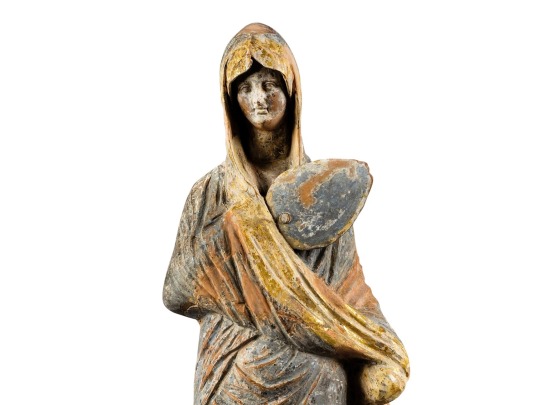
Partial Veiling: This veil covers just the top of the head or wearing a scarf. This can be a less formal or everyday expression of devotion, often used in daily prayers or minor rituals.
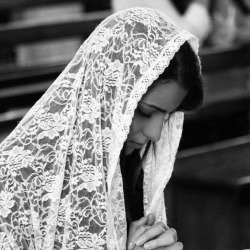
Face Veiling: In some instances, particularly in rituals involving the chthonic deities, one may veil their faces in addition to their heads. Sometimes known as Tegidion, This is done to show humility or to protect oneself spiritually when interacting with Gods associated with death or the afterlife, like Hades or Persephone.
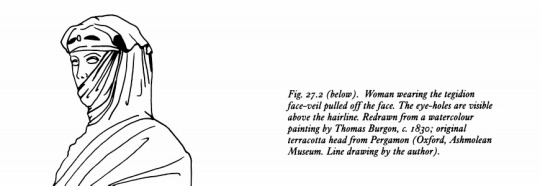
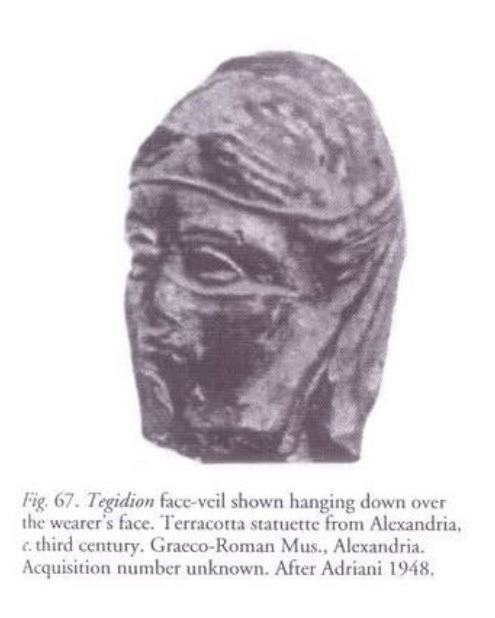
God-Specific Veiling
Veiling can be done as a specific act of devotion to certain Gods. For example:
- Hestia (Goddess of the hearth)
- Demeter and Persephone (Goddesses of agriculture and the underworld)
- Hekate (Goddess of witchcraft, crossroads, and the underworld)
As always, I can discuss this more in depth if anyone would like :)
#hellenic community#hellenic deities#hellenic devotion#hellenic pagan#hellenic polytheistic#paganism#hellenic worship#hellenism#pagan community#pagan witch#thetemple#librariantalks
305 notes
·
View notes
Text
Asteroid Vesta in your Astrological Chart. Where are you Dedicated?
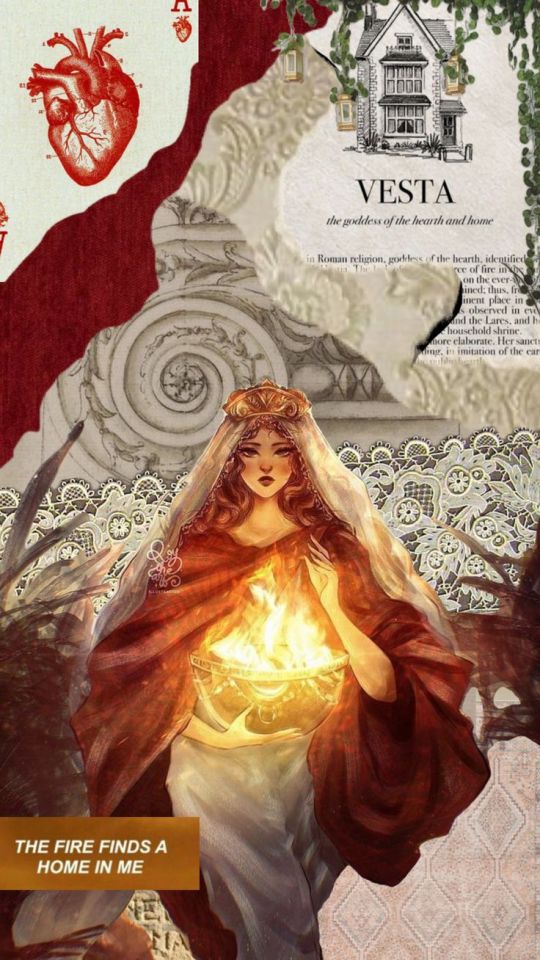
In Mythology,Vesta is the Roman goddess of hearth, home, and family. Her Greek counterpart is Hestia. Vesta's domain includes the fire at the center of the household and the community, symbolizing warmth, safety, and continuity. Her worship was fundamental to both private homes and the state.
If You Liked This Reading Sign up to TheObsidianPages777 Newsletter
+Free E-Guides on New Moon Manifestation and Gem Stone for Life Path
In Roman mythology, Vesta is a virgin goddess, embodying purity and the sanctity of domestic life. The Vestal Virgins, her priestesses, maintained the sacred flame in her temple in Rome, ensuring it never extinguished. This flame represented the heart of Rome itself, and its continuous burning was believed to guarantee the city's eternal life.
Vesta's festivals, like the Vestalia in June, involved rituals that underscored her role in protecting the home and ensuring communal harmony. Her influence extended to everyday Roman life, emphasizing the importance of the hearth as the center of family and civic stability.
In astrology, Vesta is an asteroid associated with themes of dedication, service, sacred space, and focused commitment. It represents where we invest our energy and devotion, as well as areas of life that hold sacred importance to us. When interpreting Vesta's placement in the natal chart by house, it indicates the area of life where these themes are most prominent.
Vesta in the 1st House
Focus: Personal identity, self-expression, and physical appearance.
Themes: Dedication to self-development, personal integrity, and maintaining a strong sense of identity. You might be seen as devoted to self-improvement and personal goals.
Vesta in the 2nd House
Focus: Finances, personal resources, and values.
Themes: Commitment to building financial security and valuing material possessions. You might find a sacredness in your personal values and be dedicated to preserving and enhancing your resources.
Vesta in the 3rd House
Focus: Communication, learning, and immediate environment.
Themes: Devotion to acquiring knowledge and sharing information. You might be dedicated to your siblings, neighbors, or local community, finding importance in staying informed and connected.
Vesta in the 4th House
Focus: Home, family, and roots.
Themes: A strong commitment to family and creating a sacred space at home. You might be dedicated to your family’s wellbeing and have a deep connection to your ancestry and heritage.
Vesta in the 5th House
Focus: Creativity, romance, and children.
Themes: Dedication to creative pursuits, hobbies, and self-expression. You may be deeply invested in romantic relationships or feel a sense of sacredness in your role as a parent or mentor.
Vesta in the 6th House
Focus: Work, health, and daily routines.
Themes: A strong commitment to your work, health, and service. You might find a sense of purpose in your daily routines and be dedicated to maintaining good health and being of service to others.
Vesta in the 7th House
Focus: Partnerships, marriage, and one-on-one relationships.
Themes: Dedication to partnerships and maintaining harmonious relationships. You might place great importance on your marriage or close relationships, seeing them as sacred commitments.
Vesta in the 8th House
Focus: Shared resources, transformation, and intimacy.
Themes: Deep commitment to transformative experiences and shared resources. You might find sacredness in intimate connections and be dedicated to understanding deeper psychological or mystical truths.
Vesta in the 9th House
Focus: Higher education, philosophy, and long-distance travel.
Themes: Devotion to higher learning, spiritual pursuits, and expanding your horizons. You might be dedicated to exploring different cultures, philosophies, or religious beliefs.
Vesta in the 10th House
Focus: Career, public life, and reputation.
Themes: A strong commitment to your career and public standing. You might find a sense of purpose in your professional achievements and be dedicated to attaining your goals and ambitions.
Vesta in the 11th House
Focus: Friends, groups, and social causes.
Themes: Dedication to friendships, group activities, and social causes. You might be deeply invested in your social networks and find sacredness in collective endeavors and humanitarian efforts.
Vesta in the 12th House
Focus: Spirituality, solitude, and the unconscious.
Themes: Commitment to spiritual growth and inner work. You might find solace and purpose in solitude, meditation, and exploring the subconscious mind, dedicating yourself to understanding and healing hidden aspects of your psyche.
Understanding Vesta’s placement in your natal chart can offer insights into where you feel a sense of duty and sacred dedication in your life, guiding you towards areas that hold profound meaning and significance.
Celebrity Examples:
1. Oprah Winfrey – Vesta in the 10th House
Focus: Career and public life.
Themes: Oprah is renowned for her commitment to her career and her influence in the media. Her dedication to empowering others through her platform and maintaining a strong public presence aligns with Vesta’s influence in the 10th house.
2. Albert Einstein – Vesta in the 9th House
Focus: Higher education, philosophy, and long-distance travel.
Themes: Einstein’s dedication to higher learning and the pursuit of knowledge in the field of theoretical physics reflects Vesta’s themes in the 9th house. His work transformed our understanding of the universe, showing a deep commitment to intellectual exploration.
3. Princess Diana – Vesta in the 7th House
Focus: Partnerships and marriage.
Themes: Princess Diana's life was marked by her dedication to her roles in her marriage and her public relationships. Her commitment to humanitarian causes and her efforts to maintain personal relationships are indicative of Vesta’s influence in the 7th house.
4. Steve Jobs – Vesta in the 6th House
Focus: Work and daily routines.
Themes: Jobs’ dedication to his work at Apple and his meticulous attention to detail in his daily routines highlight Vesta’s presence in the 6th house. His commitment to innovation and excellence in his work is a hallmark of this placement.
5. Frida Kahlo – Vesta in the 5th House
Focus: Creativity and self-expression.
Themes: Frida Kahlo’s intense dedication to her art and self-expression aligns with Vesta in the 5th house. Her work often explored personal and emotional themes, reflecting a deep commitment to her creative process.
6. Nelson Mandela – Vesta in the 12th House
Focus: Spirituality and solitude.
Themes: Mandela’s long imprisonment and his profound inner strength and dedication to the fight against apartheid align with Vesta’s themes in the 12th house. His commitment to justice and his spiritual resilience were central to his life and legacy
If You Liked This Reading Sign up to TheObsidianPages777 Newsletter
+Free E-Guides on New Moon Manifestation and Gem Stone for Life Path
#greek gods#asteroid astrology#astrology readings#astrology#asteroid in love#astrology observations#vesta#vesta goddess#astrology community#astroblr#astro observations#astro notes#asteroid notes
188 notes
·
View notes
Text

Ok, but make it mythical:
Dionysus as a little fae child in the wilderness vs Dionysus after beheading Pentheus.
Medusa in her priestess attire vs all snakey
Odysseus
Demeter hopeful and pregnant vs the raging crone of winter
Paris holding staring sadly at the shepherd’s crook he’s about to leave behind vs Paris staring in horror at the arrow he’s just pulled from Achilles’ heart.
Callisto vs. a glorious fat happy bear
Aphrodite fresh from the ocean, tasting an apple for the first time vs Aphrodite spattered in blood and wishing she could get rid of the golden apple that so many Trojan lives
Little Achilles smiling with his arm around Pat vs ✨ the rage ✨
Hestia with a single flame on the tip of one of her fingers like a match in the dark from inside Kronos’s innards vs Hestia getting to tend a whole alter fire for herself.
Narcissus before and after — you could do something clever with the pool
Nervous Icarus trying on his wings vs sopping wet, hair smoking, tarred and feathered trashcan of a lad giving himself a big grin and a thumbs up
#who really loves me#greek mythology#dionysus#dionysus deity#euripedes#the bacchae#the greek gods#Icarus#Achilles#achilles and patroclus#Demeter#callisto#Callisto and Artemis#medusa#before and after#glow up#aphrodite#the trojan war#art prompts#Greek mythology art
265 notes
·
View notes
Text

Ellistism and gatekeeping in the helpol community is so perplexing to me. Telling someone "this god isn't for beginners", "I'm one of the few that can speak on this god's behalf", "I'm a priestess of this god and therefore my words have more weight than yours".
Let's not forget we're all mortals and our titles are inconsequential to Them.
Truly the only people with actual bragging rights in our religion are the high priests and priestesses, and even they are expendable in Their eyes.
There's so such thing as a "beginner friendly god" or "advanced god." You don't get to dictate who can worship who, you aren't that god.
And don't be rude to beginners in the religion, or discredit those that are younger than you. The gods made oracles and priestesses of children. And you were certainly a beginner at one point. Answer questions if you can, help guide those that are just coming into this religion. And be KIND about it. There's a large difference between being stern and being a dick. Remember that the fact of the matter is, a lot of people coming into this religion are leaving another and leaving it has probably been a scary, if not traumatic part of them. Welcome then with open arms, as Lord Zeus would. Guide and nurture them the way Lady Hestia would. Show them the fun and beauty and craziness of it as if you were representing Lord Dionysus and Lord Apollo and Lady Aphrodite would. Represent your gods in a way that doesn't disgrace them.
#hellenic worship#hellenic polytheism#hellenic deities#hellenism#witchblr#hellenic community#helpol#library: vent
104 notes
·
View notes
Text
Seeing @sarafangirlart 's post about Kaos made me notice a new trend :

It's slightly better than dumb drunk but still removes the best elements about him: the frenzy, the madness, the terror, the liberation. Also, Dionysus participated in three mythological wars (Gigantomachy), two that he led himself (against Perseus and against India).
Dionysus, as the liberator and against inhibiting structures and figures of authority, immediately enters in conflict with every mortal king he meets (Pentheus, Lycurgus, Proteus, Labdacus, Perseus...) and always DISRUPTS the peace when he comes to their city.
He's not like "Hello my friends, can you worship me please 🥺 ?" His punishments are wild, seriously, some Eldritch horror stuff.
Also his great grandfather is literally ARES, I'm not even joking.
He's literally one of the worst candidates 😂.
Also, in Hades II, it's used as an excuse to remove him from the plot, which made me super upset (maybe the worst decision in the game. Right besides wrecking OdyPen).
For the peaceful god/goddess, choose Hestia, Eirene, Hypnos, Hebe, Asclepius idk, some chill deities that don't like to be involved in fights or exclusively helped people or stayed in the corner doing their own thing. Not the god who has crazy beast women as priestesses.
#this is NOT a “Dionysus is evil” post. there is a biiiig nuance between silly baby and satan. Dionysus would be right in the middle imo#btw Theseus is incredibly lucky to never have met Dionysus#he's a king AND Ariadne's ex... that wouldn't have ended well#greek mythology#dionysus#dionysos#greek myth discussion#rant#not a reblog
93 notes
·
View notes
Note
What is the nature of the relationship between Hunters of Artemis and flameskeepers of Hestia?
There's a sense of common beliefs, comradery and sisterhood. Both have similar beliefs and virtues, taking oaths in maidenhood and swearing off men and romance to dedicate themselves to their respective domains and goddess. I'd imagine they both respect the others' respective point of view and respect how both of their hands are calloused with hard work and dedication; even if one is calloused by the constant pulling of the bow and arrow and the other calloused by hardwork put into a home and food. Often you can find a priestess of Hestia and a huntress of Artemis conversing with each other. Maybe the huntresses bring the priestesses of Hestia game and things they have foraged in the wild, and in turn the priestess of Hestia repay them with a cooked meal with what they've caught and a place to sit by the fire to warm their shared calloused hands.
#pjo#pjo imagine#pjo imagines#pjo headcanons#pjo headcanon#flameskeeper#flameskeeper of hestia#hestia#priestess of hestia#hunters of artemis#artemis#huntress of artemis
38 notes
·
View notes
Text
✨Asteroid Vesta (4)✨
Hello everyone! This post is about Vesta and her influence in the natal chart! Her asteroid number on astro.com is 4. Hope you enjoy reading this post :)
✨ Vesta ✨
Vesta is the Roman goddess of the hearth, home, and family, akin to the Greek Hestia. She symbolizes the warmth and stability of the hearth fire, which was central to both domestic life and the Roman state.
In her temple in Rome, an eternal flame burned as a representation of her presence, tended by the Vestal Virgins—priestesses who vowed 30 years of chastity to serve her. Unlike many deities, Vesta had no statue; the sacred flame itself was her symbol. While she doesn't feature prominently in mythological tales, her worship was vital to Roman religious and civic life, reflecting themes of purity, protection, and continuity.
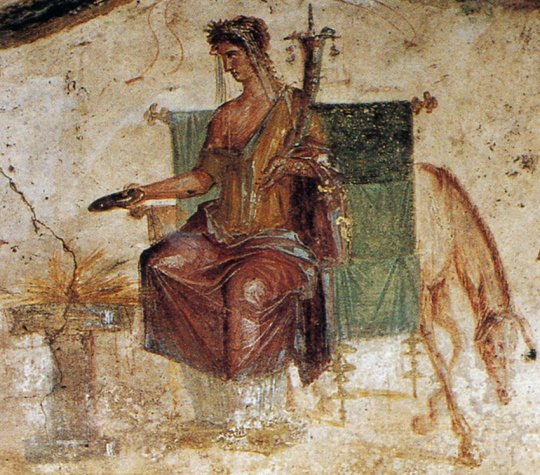
In astrology, Vesta represents focus, devotion, and the sacred flame within. Vesta symbolizes the things we hold most sacred and the commitments that inspire our dedication. It governs areas of life where we channel our energy with purity and purpose, often highlighting where we find inner peace or a sense of duty. Vesta also relates to sexuality and boundaries, reflecting the balance between personal autonomy and the devotion we give to others or to a cause. Its placement in a natal chart reveals where we seek meaning through service, ritual, or inner alignment.
✨Vesta through the Signs ✨
Vesta in Aries Devotion to independence and personal goals. This placement emphasizes the need for self-direction and pioneering spirit. You find sacred purpose through action and courage, often dedicating yourself to personal achievements or leadership roles. Boundaries may be fiercely protected.
Celebrities: Justin Bieber, George Clooney, Freddie Mercury, Emma Watson, David Bowie
Vesta in Taurus Focus on stability, comfort, and material well-being. Here, Vesta’s sacred flame burns in the pursuit of beauty, sensuality, and lasting values. You find meaning in building security, whether through relationships or material success, and tend to show unwavering commitment.
Celebrities: Jennifer Aniston, Princess Diana, Mariah Carey, Kylie Jenner, Sharon Stone
Vesta in Gemini Dedication to knowledge, communication, and intellectual exploration. Vesta in Gemini seeks sacred purpose through curiosity and mental stimulation. You may feel drawn to writing, teaching, or sharing ideas, though maintaining focus can be a challenge in the face of scattered interests.
Celebrities: Steve Jobs, Eminem, Billie Eilish, Amy Winehouse, Cameron Diaz
Vesta in Cancer Devotion to home, family, and emotional security. This placement finds sacred purpose in nurturing others and creating a safe, loving environment. Emotional boundaries are important, as overextending yourself in caregiving can lead to burnout.
Celebrities: Marilyn Monroe, Madonna, Michael Jackson, Rihanna, Jennifer Lopez
Vesta in Leo Focus on self-expression, creativity, and recognition. Vesta in Leo is devoted to living authentically and inspiring others through personal passions. You thrive when your work or pursuits allow you to shine but must guard against neglecting others’ needs for the sake of your own spotlight.
Celebrities: Kim Kardashian, Kanye West, John Lennon, Jay-Z, Adele
Vesta in Virgo Dedication to service, healing, and precision. Vesta in Virgo channels her energy into perfecting systems and helping others, often through detailed or practical work. You find sacred purpose in improving lives and creating order but must be mindful of becoming overly critical or self-sacrificing.
Celebrities: Johnny Depp, Katy Perry, Bill Gates, Chris Evans, Christina Aguilera
Vesta in Libra Devotion to harmony, relationships, and balance. This placement finds sacred purpose in partnership and the pursuit of fairness. You may dedicate yourself to fostering beauty and equality in your environment, but it’s important to maintain your individuality within relationships.
Celebrities: Beyoncé, Selena Gomez, Lana Del Rey, Scarlett Johansson, Kendall Jenner
Vesta in Scorpio Focus on transformation, intimacy, and emotional depth. Vesta in Scorpio seeks sacred purpose in uncovering hidden truths and experiencing profound connections. This placement may drive intense focus and passion, but it also requires care in managing obsessive or possessive tendencies.
Celebrities: Kurt Cobain, Nicole Kidman, Timothée Chalamet, Cristiano Ronaldo, Brigitte Bardot
Vesta in Sagittarius Dedication to exploration, freedom, and higher learning. Vesta in Sagittarius burns brightly in pursuits of adventure, philosophy, or spiritual growth. You find sacred meaning in broadening your horizons and sharing knowledge, though commitment may feel restrictive at times.
Celebrities: Leonardo DiCaprio, Brad Pitt, Miley Cyrus, Britney Spears, Julia Roberts
Vesta in Capricorn Focus on ambition, discipline, and long-term goals. Vesta in Capricorn is devoted to achievement and creating lasting structures, whether in career, family, or society. You find sacred purpose in your work and responsibilities but must balance this with emotional fulfillment.
Celebrities: Elvis Presley, Zayn Malik, Chris Brown, Carla Bruni, Bradley Cooper
Vesta in Aquarius Dedication to innovation, individuality, and humanitarian ideals. Vesta in Aquarius seeks sacred meaning through progressive causes or unconventional paths. You may devote yourself to improving society or championing unique ideas, finding fulfillment in breaking barriers or challenging norms.
Celebrities: Taylor Swift, Elon Musk, Nicki Minaj, Tupac Shakur, Jared Leto
Vesta in Pisces Focus on spirituality, compassion, and creative flow. Vesta in Pisces is devoted to transcendent experiences and emotional connection. You may feel drawn to artistic expression or helping others, finding sacred purpose in unity and forgiveness, but need to guard against over idealization or self-sacrifice.
Celebrities: Angelina Jolie, Lady Gaga, Robert Pattinson, Harry Styles, Ariana Grande
✨Vesta through the Houses✨
Vesta in the 1st House Devotion to self-expression and personal identity. Your focus is on cultivating individuality and embodying your inner fire. Others may see you as highly driven, but you must balance personal pursuits with consideration for others.
Celebrities: Brad Pitt, Kanye West, George Clooney, Nicole Kidman, Mariah Carey
Vesta in the 2nd House Dedication to building security, wealth, and personal values. You may find meaning in managing resources or developing self-worth. This placement highlights the sacred nature of material stability but warns against overattachment to possessions.
Celebrities: Ariana Grande, Megan Fox, Billie Eilish, David Bowie, Adele
Vesta in the 3rd House Focus on communication, learning, and sharing ideas. You are deeply devoted to intellectual pursuits and may channel your energy into writing, teaching, or connecting with others. Maintaining clear mental boundaries is key to avoiding burnout.
Celebrities: Taylor Swift, Johnny Depp, Leonardo DiCaprio, Britney Spears, Selena Gomez
Vesta in the 4th House Sacred devotion to home, family, and emotional roots. This placement suggests a strong focus on creating a sanctuary or preserving family traditions. You may feel called to nurture others but should guard against losing yourself in family obligations.
Celebrities: Rihanna, Justin Bieber, Princess Diana, Shakira, Kylie Jenner
Vesta in the 5th House Dedication to creativity, romance, and self-expression. Your sacred purpose may involve artistic pursuits, personal passions, or inspiring others through joy and play. Balance is needed to ensure that personal fulfillment doesn’t overshadow responsibilities.
Celebrities: Michael Jackson, Harry Styles, John Lennon, Princess Catherine, Chris Brown
Vesta in the 6th House Devotion to service, work, and well-being. This placement emphasizes commitment to daily routines, health, and helping others. You find purpose in making life more efficient or productive but must avoid overworking or neglecting your own needs.
Celebrities: Keanu Reeves, Julia Roberts, Kendall Jenner, Jennifer Lawrence, Elizabeth II
Vesta in the 7th House Focus on relationships, partnerships, and balance. You are devoted to building meaningful connections and may find sacred purpose in helping others achieve harmony. However, it’s important to avoid losing your identity in your partnerships.
Celebrities: Miley Cyrus, Elon Musk, Eminem, Jennifer Aniston, Emma Watson
Vesta in the 8th House Dedication to transformation, intimacy, and shared resources. This placement suggests a deep focus on uncovering hidden truths and navigating life’s mysteries. You may find sacred purpose in healing, exploring taboo topics, or managing power dynamics.
Celebrities: Prince Harry, Drake, Catherine Zeta-Jones, Matt Damon, Kendrick Lamar
Vesta in the 9th House Sacred devotion to exploration, spirituality, and higher knowledge. You are drawn to pursuits involving travel, philosophy, or teaching. This placement highlights a need for freedom to seek truth but warns against being overly dogmatic or restless.
Celebrities: Angelina Jolie, Jennifer Lopez, Kim Kardashian, Steve Jobs, Sharon Tate
Vesta in the 10th House Focus on career, public life, and long-term goals. You are highly devoted to achieving success and may find purpose in contributing to society or building a lasting legacy. Work-life balance is crucial to avoid overidentifying with your career.
Celebrities: Lady Gaga, Scarlett Johansson, Cristiano Ronaldo, Natalie Portman, Zayn Malik
Vesta in the 11th House Dedication to community, friendships, and progressive causes. You find meaning in working for collective goals or championing innovative ideas. This placement encourages collaboration but warns against losing personal focus in group dynamics.
Celebrities: Madonna, Katy Perry, Cameron Diaz, David Beckham, Kristen Stewart
Vesta in the 12th House Focus on spirituality, inner growth, and hidden dimensions of life. Your sacred purpose may involve helping others, exploring dreams, or delving into the subconscious. This placement highlights compassion and transcendence but requires boundaries to avoid self-sacrifice.
Celebrities: Marilyn Monroe, Beyoncé, Robert Pattinson, Lana Del Rey, Heath Ledger
I thank you all for reading my post on Vesta, and I would like to know if any of it resonated with you!
Sending love, Xx
#astrology#astrology interpretation#asteroid#asteroid astrology#vesta#celebrity astrology#myth#mythology#roman mythology
42 notes
·
View notes
Text
Tarot Card Major Arcana Deity List
0 - The Fool: Loki, Pan, Zeus (rarer), Dionysus, Hermes (rarer), Aeolus
I - The Magician: Loki (Rarer), Odin, Hermes, Thoth, Nephthys, Asteria, Circe, Selene (rarer), Medusa, Medea, Cerridwen, Rhiannon, Brigid, Pazuzu, Vasago, Paimon
II - The High Priestess: Persephone, Nyx, The Morrigan, Hekate, Frigg, Selene, Isis, Artemis, Feyja, Ganesha, Daphne, Eir, Nicneven, The Virgin Mary, Guan Yin
III - The Empress: Aphrodite, Persephone (Rarer), Nyx, The Morrigan, Frigg, Hera, Freyja, Isis, Hathor, Astarte, Demeter, Ishtar, Leto, Rhea, Artio, Rashoon, Gremory, Guan Yin
IV - The Emperor: Hades, The Morrigan (rarer), Odin, Ares, Lucifer (semi-rare), Zeus, Horus, Osiris, Ra, Sobek, Beelzebub, Anubis (rarer), Morpheus
V - The Hierophant: Apollo, Hekate (rarer), Osiris, Thoth, Athena, Horus, Hermes (rarer), Odin, Brigid, Saraswati, Ganesha, Dionysus, Prince Stolas, Orobas
VI - The Lovers: Loki (Rarer), Aphrodite, Anubis (Rarer), Hera, Frigg, Rhea, Gaia, Demeter (rarer), Ishtar, Parvati, Hathor, Isis, Brigid, Freyja (semi-rare), Osiris, Cernunnos, Freyr, Dionysus, Pan (semi-rare), Eros, Psyche, Furfur, Gremory, Lilith
VII - The Chariot: Apollo, Ares, Athena, Hades (Rarer), Thor, The Morrigan (Semi-rare), Nike, Astarte, Ishtar, Freyja, Bast, Odin, Hebe, Helios, Eos, Rhea
VIII - Strength: Athena (Rarer), The Morrigan (Rarer), Thor, Hestia, Bast, Sekhmet, Brigid, Isis, The Dagda, The Virgin Mary, The Muses, Heracles, Nike, Sigyn, Fenrir, Malphas, Vapula, Archangel Michael
IX - Hermit: Persephone, Loki (rarer), Hekate, Odin, Isis, Hestia, Hades (rarer), Brigid, The Muses, Hermes (Rarer), Saraswati, Asteria, Nyx, Circe, Erebus, Ceto, Morpheus, The Morrigan, Cerridwen, Vesta
X - Wheel of Fortune: Tyche, Fortuna, Odin (rarer), Hekate (rarer), Frigg, Zeus, Hathor, Isis, The Dagda, Loki (rarer), Fortuna, Jormungandr
XI - Justice: Athena, The Morrigan (semi-rarer), Hekate (rarer), Hera, Lugh, Nemesis, Themis, Nike, Zeus (semi-rare), Fenrir, Skadi
XII - The Hanged Man: Loki (Rarer), Odin, Lucifer (rarer), Artemis, Osiris, Persephone (rarer), Ishtar, Buddha, Jesus, Green Man, Poseidon, Arachne, Anubis (rarer), Apolla (rarer)
XIII - Death: Hades, Nyx, The Morrigan, Hekate, Odin, Lucifer, Persephone (rarer), Isis, Hel, Freyja (rarer), Anubis, Osiris, Thanatos, Morana, Nephthys, Cerberus, Melinoe, Santa Muerte, Baron Samedi, Jormungandr, Medusa
XIV - Temperance: Selene, Hekate (rarer), Aphrodite (rarer), Artemis, Isis, Apollo (semi-rare), Hestia, Iris, Sigyn
XV - The Devil: Loki, Lilith, The Morrigan (semi-rarer), Odin (semi-rare), Lucifer, Dionysus, Pan, Set/Seth, Cernunnos
XVI - The Tower: Loki (Rarer), Odin (semi-rare), Eris, Ares, Sekhmet, Hel, The Morrigan (rarer), Horus, Ceto, Poseidon, Beelzebub, Malphas, Kali
XVII - The Star: Aphrodite (Rarer), Nyx, Hermes, Lucifer, The Star (rarer), Thoth, Ishtar, Astrea, Isis, The Virgin Mary, Nuit, Hebe, Fama/Pheme, Psyche
XVIII - The Moon: Selene, Hekate, Nyx, The Morrigan, Artemis, Chang'e, Rhiannon, Isis, Phoebe, Thoth, Anubis (rarer), Hypnos, Cerberus, Morpheus, Leviathan
XIX - The Sun: Apollo, Amaterasu, Ra, Helios, Artemis, Athena, Lucifer (rarer), Lugh, Helios, Brigid, Bast, Sekhmet, Ra, Horus, Freyr, Eos
XX - Judgement: Anubis, Athena, The Morrigan, Odin, Hera, Persephone (rarer), Osiris, Hephaestus, Isis, Horus, Hades (rarer), Nemesis, Archangel Michael
XXI - The World: Konshu, Aphrodite (Rarer), Gaia, Hermes, Demeter, The Dagda, Isis, Gaia, Cernunnos, Green Man, Iris, Antheia, Skadi, Guan Yin, Eos, Tyche, Jormungandr
37 notes
·
View notes
Text
A Baby Witch's First Grimoire
Grimoire Entry 21 - Persephone Correspondences

The Kidnapping of Persephone
Zeus had three sisters. Hera was the goddess of marriage and queen of the gods. Hestia was the goddess of the home and hearth. His third sister, Demeter, was in charge of the harvest. Every god/goddess' job was important. Demeter's work was extremely important however. If she was upset, the crops could die.
Everyone, gods and mortals, worked hard to keep Demeter happy. Her happiness came from spending time with her daughter Persephone. Persephone had matured into a stunning young woman. One day, while collecting flowers in the fields, Hades, the god of the underworld, noticed her. Hades was usually an unhappy person. But Persephone's beauty had mesmerized him. He fell quickly in love. Before anybody could intervene, Hades grabbed Persephone and retreated to the darkest depths of the underworld, carrying her with him.
Persephone sobbed uncontrollably while imprisoned in a room in Hades' Hall. She refused to speak with Hades. She refused to eat. According to legend, if you ate anything in Hades, you would be unable to leave. She wasn't sure if the rumor was true, but she didn't want to take the chance in case someone arrived to save her. Nearly a week had passed. Finally, unable to stand her hunger, Persephone ate six pomegranate seeds. It seemed her fate was sealed. She'd have to live in the Underworld forever.
Meanwhile, back on Earth, Zeus was concerned about the crops. People would die if the harvests failed and he needed to do something. Zeus did what he normally did. He dispatched Hermes, his youngest son as his messenger, to make a deal with Hades. When Hermes learned that Persephone had consumed six pomegranate seeds, he had to think quickly. He made a bargain with Hades: if Persephone married him, she would serve as queen of the underworld for six months of the year.
However, Persephone would have to come back every spring to spend the other half of the year on Earth. Hades agreed. Zeus agreed. Persephone agreed. At last, Demeter finally agreed. Demeter promised that each spring all the flowers bloom to greet her daughter, the Queen of the Underworld, upon her return. Demeter cries every autumn as Persephone makes her way back to Hades, allowing all the harvests to perish until April, when the cycle begins anew.
Associations
Torch
Sheaf of Grain
Wheat
Asphodel
Pomegranate
Seeds of grain
Narcissus
Wildflowers
Modern Offerings
Crystals
Amethyst
Onyx
Obsidian
Topaz
Citrine
Pink Tourmaline
Incense
Frankincense
Vanilla
Anything Floral
Colors
Black
Green
Blue
Purple
Magenta
Yellow
Food & Drinks
Red Wine
Olive Oil
Water
Fruit
Honey
Milk
Grains
Bread
Pomegranates
Herbal or Floral Tea
Dark Chocolate
Mint
Tarot Cards
The High Priestess
The Hermit
Miscellaneous
Images of what she's associated with
Flowers (Real or Fake)
Sheaf of Wheat
Freshly Harvested Fruits
Fake/Decoration Fruits
Crowns
Bones (Real or Fake)
Jewelry
Feel free to check out my master post for more information!
#magick#paganism#wicca#witchblr#witchcraft#baby witch#pagan#witch stuff#witch#witch community#magic#witches#witchcore#eclectic witch#eclectic pagan#hellenic polytheism#hellenic pagan#hellenism#hellenic deities#persephone#greek gods#A Baby Witch's First Grimoire
30 notes
·
View notes
Text
DEMETER

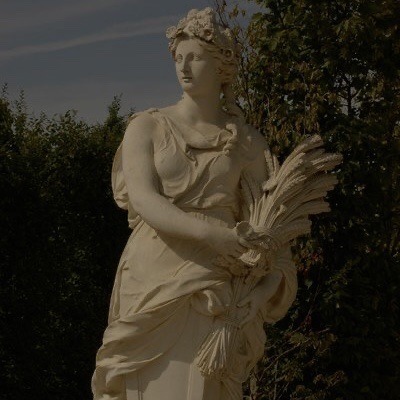

WHO IS SHE?
Demeter is the powerful Greek goddess of agriculture, fertility, and harvest. She is known for nurturing and promoting the growth of crops and the natural fertility of the Earth. She is often depicted holding a sheaf of wheat or a torch and is associated with the changing of the seasons. Demeter's daughter, Persephone, was abducted by Hades, the god of the underworld, which led Demeter to search for her daughter and eventually brought about the cycle of the seasons.
BASIC INFO:
Appearance: Demeter is often depicted as a beautiful and compassionate goddess, with long, flowing hair, and a serene and nurturing expression. She is sometimes shown wearing a long robe or dress adorned with symbols of agriculture, such as fruits, grains, and vines. She is also often represented with a wreath of flowers in her hair or a crown of golden grain or leaves around her head. In some depictions, she is shown riding a chariot pulled by horses, symbolizing her power and majesty.
Personality: she is known for being a nurturing and compassionate goddess, particularly towards her devotees. She is often depicted as a loving and caring mother figure who guides and supports her followers. Demeter is known for her strong connection to the Earth and the natural world, and her devotees often view her as a source of fertility, abundance, and prosperity. Demeter is also known for her strength and resilience, and is often associated with the power of nature and the resilience of the human spirit.
Symbols: wheat, torches, chalice or cup, throne, and cornucopia
Goddess of: agriculture, harvest, fertility, and motherhood
Culture: Greek
Plants and trees: olive trees, barley, mint, poppy, corn, grape vine, sunflower, cypress, sheaves of wheat, foxglove, daisy, columbine, ash and oak trees, acorns, flax, and pomegranate
Crystals: alamosite, chrysanthemum stone, alabandite, wairakite, clinoptilolite, almandine spinel, chloromelanite, amorite, wavellite, cat’s eye, emerald, amber, pearl, star sapphire, almandine garnet, rhodolite, axinite, conichalcite, fuchsite, and citrine
Animals: snake, pig, gecko, turtle dove, crane, screech owl, and grasshopper
Incense: orange blossom, myrrh, olibanum, civet, patchouli, violet, cloves, and cinnamon
Practices: pregnancy rituals, harvest rituals, fertility magick, marriage and relationship rituals, plant and earth magick, transformation, renewal, and healing
Colours: gold, green, dark brown, navy blue, and pink
Number: 4
Zodiac: Virgo
Tarot: The High Priestess and The World
Planets: Mercury and Earth
Days: Wednesday, Chloia, Thesmophoria, and Eleusinian Mysteries
Parents: Cronus and Rhea
Siblings: Hestia, Hera, Hades, Poseidon, and Zeus
Partners: Zeus, Poseidon, Iasion, Karmanor, and Mecon
Children: Persephone, Despoina, Eubuleus, Arion (horse), Plutus, Philomelus, Iacchus, The Acheron, and Hecate (Orphic)
MISC:
Grains and agriculture: Demeter is associated with grains and agriculture because she is the goddess of the harvest and fertility. In ancient Greece, she was venerated as the goddess who brought about the bounty of the harvest and ensured that the crops grew and provided sustenance for the people. She was also associated with the cycle of the seasons and the changing of the growing seasons, ensuring that the fields remained fertile and plentiful. Demeter was often depicted holding a sheaf of wheat or a torch, representing her role in the cultivation and care of the grain crops.
Torches: in ancient Greek culture, torches were used to symbolize purification and ritual offerings. Demeter, as the goddess of agriculture and harvest, was often depicted holding a torch as a symbol of her power to nurture and support the growth of crops. The use of torches in her imagery also reflected her connection with the sun and the natural rhythms of the seasons, which she was believed to control. In addition, torches were also associated with rituals of illumination and protection, further emphasizing Demeter's role as a protective and nurturing deity.
The Underworld: her connection to the Underworld is closely tied to her daughter, Persephone. In the Greek myth, Hades, the god of the Underworld, abducted Persephone and took her down to the Underworld to be his wife and queen. Demeter, heartbroken by her daughter's abduction, searched for her and refused to bring about the renewal of the seasons on Earth until Persephone was returned to her. In some versions of the myth, Demeter ultimately reached a compromise with Hades, allowing Persephone to spend part of the year with her mother on Earth and part of the year with her husband in the Underworld.
Grape vine: Demeter is associated with grape vines and the harvest of grapes because they are a symbol of fertility and abundance. In ancient Greece, the cultivation of grapes and wine-making were a significant part of the agricultural process, and Demeter was revered as a goddess of the harvest and the fertility of the land. The grapevine was also seen as a symbol of transformation, as the grapes undergo a process of fermentation to become wine, symbolizing the transformative power of nature and the cycle of life and death. As the goddess of the harvest and seasonality, Demeter was closely associated with the growth and cultivation of grape vines.
Turtle dove: she is associated with the turtle dove due to its close connection with fertility and motherhood. In ancient Greece, the turtle dove was seen as a symbol of fertility and a harbinger of spring, as it would return to its nesting grounds during the warmer months, when the vegetation grew and the weather became more conducive to planting and growth. This symbolized the power of Demeter to bring about the fertility of the land and the regrowth of the natural world during the spring and summer months. Additionally, the turtle dove was also seen as a symbol of peace and purity, which were important values in ancient Greek culture.
Motherhood: the association of Demeter with motherhood and fertility stems from her role as the goddess of agriculture and the harvest. As the goddess responsible for the abundance and growth of the land, Demeter was believed to possess the powers of fertility and nourishment. Her ability to ensure a bountiful harvest and the growth of the plants and crops was seen as a symbol of her nurturing and caring nature, similar to a mother caring for her children. This connection to motherhood and fertility is also reflected in her role as the mother of Persephone, the daughter that she searches for and protects.
FACTS ABOUT DEMETER:
The Romans associated Demeter with Ceres.
Demeter was often depicted traveling in a golden chariot drawn by horses or dragons.
When approached with genuine respect and an understanding of her nature, Demeter is incredibly generous. In rituals and spells, invoking Demeter for her blessings in growth, nurturing, and sustenance typically yields positive and enriching results.
The Greeks celebrated Demeter with many festivals and celebrations throughout the year, usually in the fall around harvest time.
Demeter was also a chthonic deity, meaning she had connections to the Underworld.
She has the ability to transform things into plants, and the ability to manipulate plants, and the Earth and Weather Manipulation; the power to control the weather in a wide range of distances. She can create or summon clear sky, rain, hail, snow, thunderstorms, tornadoes, hurricanes, etc. It can be offensively, or can be a cycle of life for everyday human beings given that she once covered the earth in ice and snow.
Demeter was swallowed upon her birth, like all her siblings, and was saved by the craftiness of her mother Rhea and her brother Zeus.
HOW TO INVOKE DEMETER:
To invoke Demeter, you can begin by finding a quiet and peaceful space where you can focus your attention on connecting with her. Light a white or green candle to represent the purifying and fertile energy of the Earth. You can also use herbs or flowers associated with Demeter, such as wheat, barley, or white lilies, to create an altar or sacred space. Sit and centre yourself. Take slow and deep breaths, and when you feel ready, call upon Demeter to join you in the space. You can use her name, "Demeter," or ask for her guidance and support.
PRAYER FOR DEMETER:
Divine Demeter, Great Mother of the Harvest, Giver of life and the bounties of the earth, I stand before you with reverence and awe, Honouring your endless cycle of growth and rebirth.
In your sacred fields, the grains rise and bow, Under your watchful eye, all life flourishes. Oh, nurturing goddess, hear my humble vow, To cherish the earth, and its gifts to nourish.
Bless these fields, these gardens, with your touch, Let them yield their abundance in your name. May my hands be an extension of your love, Sowing seeds of hope, free from pain and blame.
As the seasons turn, from spring to winter’s chill, Guide me through the cycles of loss and gain. In the depths of sorrow, let your wisdom be my will, In joyous harvest, let your laughter reign.
Demeter, Great Mother, in your grace I seek, Strength to protect, and wisdom to feed the soul. Through each day, each night, each week, Guide me towards the ultimate, harmonious goal.
In gratitude, I offer you these humble gifts, Fruits of the earth, and labours of my hands. May they be pleasing in your celestial midst, Symbols of the bond that between us stands.
Hail Demeter, in your honour I rejoice, For the love and abundance you freely give. With this prayer, I lend my voice, In your sacred name, I choose to live.
Blessed Be, Mother Demeter.
SIGNS THAT DEMETER IS CALLING YOU:
A deep passion for agriculture, farming, or gardening.
Desire to cultivate personal growth and transformation in your life.
A sense of nurturing and caregiving towards others.
Increased dreams or visions associated with the Earth or nature.
Feelings of comfort and protection in natural environments.
A pull towards learning more about Demeter or the Greek goddesses.
Experiencing synchronicities or meaningful coincidences related to the seasons, fertility, or nature.
Having a strong desire to practice sustainable living and living in harmony with the Earth.
Feeling a deep reverence or respect for the female form and its connection to nature.
A fascination with the rhythms and cycles of the seasons.
Wanting fertility and abundance in your life.
A longing for a connection with the Earth and the land.
Desire to explore and celebrate the natural cycle of the seasons and their meaning in your life.
Sensing a presence of a motherly or nurturing energy in your life.
Feeling a growing understanding of the interconnectedness of all things in nature.
Developing a greater appreciation for the power of change and transformation.
Experiencing a sense of reverence or awe for the beauty and wonder of the natural world.
A stronger connection to the feminine energy within yourself.
OFFERINGS:
Olive oil.
Water.
Fruit.
Baked goods.
Mint ice cream.
Crystals/metals: pearls, star sapphire, cat's eye, silver, ivory, emerald, sardonyx, carnelian, amber, mercury, and copper.
Honey.
Milk.
Grains.
Incense, such as orange blossom, myrrh, olibanum, civet, patchouli, violet, cloves, and cinnamon.
Bread.
Freshly harvested goods.
Goat’s cheese.
Fresh herbs.
Red wine.
Herbal tea.
Meat with bones, eaten with hands.
Three figs.
Kykeon.
Oranges.
DEVOTIONAL ACTS:
Honour her children.
Supporting your farmer’s market.
Composting.
A trip to a local park or botanical garden.
Drink green tea with honey.
Cleaning litter from nature.
Do some gardening.
Learn to take care of plants.
Spend time and take care of your pets/animals if you have any.
Go on a walk in nature.
Pick flowers.
Go foraging (safely).
Read up on your native and invasive plant species.
Learn to cook.
Read and write recipes.
Learn about ecosystems and the environment.
Donate to food banks.
Spend more time in meadows.
Make a smoothie.
Plant flowers with butterflies and bees in mind.
Drive with the windows down.
Wear loose/flowing clothes.
Attend small music performances.
Preserve food (canning, dehydrating, etc).
Wear wood jewelry.
Plant flowers with butterflies and bees in mind.
Expand (or start) your vegetable garden.
Go to an orchard.
Eat whole-grain foods.
Help the worms that get trapped on the sidewalk.
Keep dried flowers around.
Go to a farmers market.
Practice loving yourself.
Scatter wildflower seeds in places that need it.
Take a gardening class.
Burn a lantern (to guide you in whatever you need).
#fyp#fypシ#fypシ゚viral#fypage#fyppage#tumblr fyp#witchcraft#witch#witches#witchcore#witch community#demeter#goddess#greek mythology#greek goddess#greek deities#info post#information#helpful#masterlist#themortuarywitch
25 notes
·
View notes